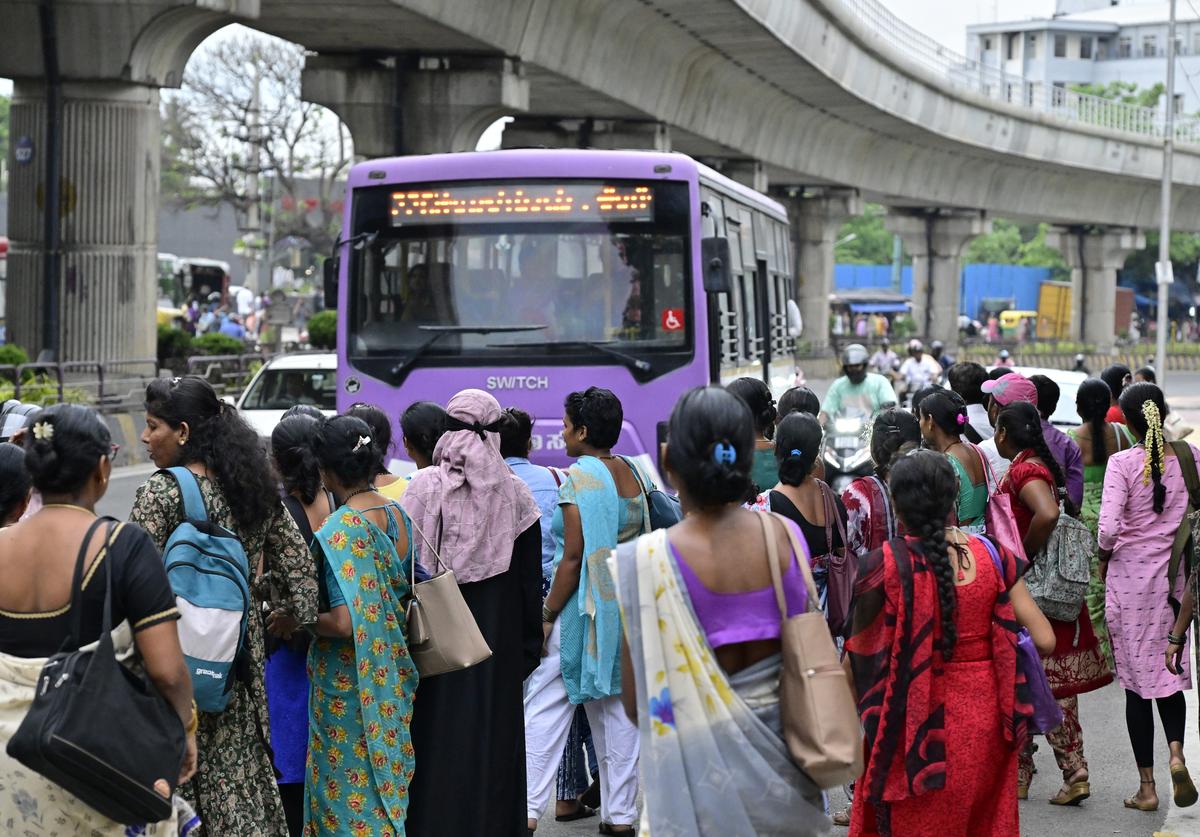
The findings come from a new report titled “Beyond Free Rides: A Multi-State Assessment of Women’s Bus Fare Subsidy Schemes in Urban India”.
| Photo Credit:
K. MURALI KUMAR
A 23% jump in women’s employment in Bengaluru and a 21% increase in Hubballi-Dharwad have been recorded following the implementation of Karnataka’s Shakti Scheme, which offers fare-free bus travel to women, according to a new study.
The report highlights Karnataka as the best-performing State among five-studied States, in terms of linking free public transport to employment gains for women. The findings come from a new report titled “Beyond Free Rides: A Multi-State Assessment of Women’s Bus Fare Subsidy Schemes in Urban India”, commissioned by the Sustainable Mobility Network and conducted by Nikore Associates.
The report is based on over 2,500 surveys, focus group discussions, and key informant interviews conducted across 10 cities in Delhi, Karnataka, Kerala, Maharashtra, and West Bengal, according to the study.
In Karnataka, nearly 27% of women in both Bengaluru and Hubballi-Dharwad reported switching to buses because of the scheme, while many said they now travel more frequently and farther for work, education, and other essential needs, the study claims.
Mitali Nikore, Founder and chief economist of Nikore Associates, said, “The Shakti Scheme is enabling more frequent travel, longer trips, and better access to essential services, especially for women who were previously limited by cost. Karnataka’s experience shows what’s possible when intention meets inclusive access.”
‘Met primary objective’
Speaking about the findings, Minister for Transport Ramalinga Reddy said, “The primary objective of the Shakti Scheme is to empower women, and the increase in women’s employment highlighted in the study is an encouraging sign.”
“I have observed that since the scheme was introduced, a large number of women particularly from lower-middle and middle-income families have been using the free bus service to commute for work. Many have found jobs in sectors such as healthcare, hospitality, manufacturing, retail, and domestic services, among others,” Mr. Reddy told The Hindu.
Persistent challenges
However, the report flags persistent challenges, particularly around first-and-last-mile connectivity. Many women living in peripheral urban areas continue to depend on autorickshaws or other paid options to reach bus stop, costs that eat into their savings and limit the impact of the fare-free scheme.
Safety remains another key barrier. Despite rising bus usage, less than half of women in Bengaluru and Hubballi-Dharwad reported feeling safe while commuting. Issues cited include harassment, overcrowding, poor lighting, and lack of staffing at bus stops.
To improve the effectiveness of the Shakti Scheme and others like it, the report recommends: fleet expansion to meet rising demand, gender-sensitive staffing and training of transport workers, installation of safety infrastructure like CCTV cameras, lighting, and responsive helplines, and better integration with first-mile and last-mile options.
From June 11, 2023, to July 24, 2025, the Shakti Scheme enabled over 508 crore trips for women passengers to travel free of cost across the four State transport undertakings—Karnataka State Road Transport Corporation, Bengaluru Metropolitan Transport Corporation, North Western Karnataka Road Transport Corporation, and Kalyana Karnataka Road Transport Corporation. The ticket value of women passengers travelled is ₹12,881 crore.
Published – July 25, 2025 10:03 pm IST


